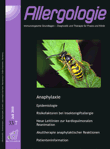
ALLERGOLOGIE
Scope & Guideline
Bridging the Gap Between Research and Clinical Practice
Introduction
Aims and Scopes
- Allergen Immunotherapy (AIT):
The journal consistently publishes research on allergen immunotherapy, discussing various methods, efficacy, and safety profiles of treatments for different allergens. - Diagnosis and Management of Allergies:
A significant portion of the content revolves around the diagnosis and management of various allergic conditions, including guidelines for practitioners. - Molecular and Component-Resolved Diagnostics:
Research focusing on the molecular aspects of allergies and the development of component-resolved diagnostics is a key area, reflecting advancements in precision medicine. - Atopic Conditions and Comorbidities:
The journal frequently addresses atopic conditions such as asthma, rhinitis, and dermatitis, emphasizing their interconnections and the impact of comorbidities. - Emerging Allergens and Environmental Factors:
There is a growing focus on new allergens, including those related to climate change and urbanization, as well as their implications for public health. - Regulatory and Legal Aspects of Allergy Treatments:
The journal also emphasizes the legal and regulatory frameworks guiding the development and approval of allergen products and therapies.
Trending and Emerging
- Biologics and Targeted Therapies:
There is a significant increase in research focused on biologics and targeted therapies for allergic conditions, particularly in the management of severe asthma and atopic dermatitis. - Digital Health and mHealth Applications:
The emergence of digital health solutions, including mobile health (mHealth) applications for allergy management, is a growing trend, indicating the integration of technology in patient care. - Microbiome and Allergy Interactions:
Research exploring the relationship between the microbiome and allergic diseases is gaining prominence, reflecting an interest in understanding the underlying mechanisms of allergy development. - Climate Change and Allergy Patterns:
An increasing number of studies are examining how climate change affects allergen distribution and sensitization patterns, highlighting the public health implications of environmental changes. - Personalized and Precision Medicine Approaches:
The journal is increasingly featuring articles that focus on personalized medicine approaches in allergy diagnosis and treatment, emphasizing the need for tailored therapies based on individual patient profiles.
Declining or Waning
- Occupational Allergies:
Although historically significant, research specifically focused on occupational allergies seems to be less frequently published, possibly due to a shift in focus towards more prevalent allergens and conditions. - Traditional and Non-Specific Allergy Treatments:
There is a noticeable decrease in articles discussing traditional or non-specific treatments for allergies, as the field moves towards more targeted and personalized therapies. - General Allergen Exposure Studies:
While general studies on allergen exposure were previously common, the journal is now trending towards more specific research that integrates molecular and individual patient data. - Classic Allergy Testing Methods:
The frequency of discussions surrounding traditional allergy testing methods, such as skin prick tests, appears to be waning as newer methodologies gain traction.
Similar Journals
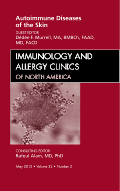
IMMUNOLOGY AND ALLERGY CLINICS OF NORTH AMERICA
Connecting Scholars for Groundbreaking DiscoveriesIMMUNOLOGY AND ALLERGY CLINICS OF NORTH AMERICA is a premier journal published by W B SAUNDERS CO-ELSEVIER INC, focusing on the dynamic fields of immunology and allergy. With an ISSN of 0889-8561 and an E-ISSN of 1557-8607, this journal has consistently ranked in the Q2 category in both Immunology and Immunology and Allergy as per 2023 metrics, underscoring its critical role in academia. It provides cutting-edge research, comprehensive reviews, and practical insights that cater to the needs of researchers, clinicians, and students alike. Though the journal is not open access, it remains an essential resource for those involved in advancing knowledge and clinical practice in allergy and immunology. With its converged years stretching from 1987 to 2024, the journal serves as a rich repository of scientific advancements, fostering progress in diagnosis, treatment, and prevention of allergic diseases and immune disorders. Positioned within the United States and based in Philadelphia, it plays a vital role in promoting scholarly communication within these impactful fields.

Egyptian Journal of Pediatric Allergy and Immunology
Championing advancements in the understanding of pediatric allergies.Welcome to the Egyptian Journal of Pediatric Allergy and Immunology, a leading academic platform dedicated to the advancement of knowledge in the field of pediatric allergy and immunology. Published by the prestigious Egyptian Society of Pediatric Allergy & Immunology, this journal aims to address the pressing challenges and breakthroughs in the diagnosis, treatment, and management of allergic diseases in children. As a crucial resource for researchers, healthcare professionals, and students, it focuses on disseminating high-quality, peer-reviewed articles that contribute to the global understanding of allergic conditions and immunological responses in pediatric populations. Although the journal is currently not an Open Access publication, it provides a valuable gateway to research findings that can shape clinical practice and influence future investigations. With an emphasis on contributing to improved healthcare outcomes for children suffering from allergy and immunology disorders, the Egyptian Journal of Pediatric Allergy and Immunology stands out as an essential reference in the field.
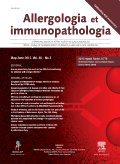
ALLERGOLOGIA ET IMMUNOPATHOLOGIA
Unveiling New Discoveries in Allergy and Immunological HealthALLERGOLOGIA ET IMMUNOPATHOLOGIA is a distinguished academic journal dedicated to the field of immunology and allergy, published by CODON PUBLICATIONS, based in Singapore. With its ISSN 0301-0546 and E-ISSN 1578-1267, this journal aims to provide an open platform for researchers and practitioners to share their findings, emphasizing topics related to immunopathology and respiratory health. Covering a broad scope from 1973 to 2024, it currently holds a notable position in several category quartiles, including Q3 in Immunology and Allergy, and Q3 in Pulmonary and Respiratory Medicine as of 2023. Despite the absence of an open access option, the journal maintains an essential role in disseminating pivotal research, reflected in its Scopus rankings that position it within the core of its discipline. With an impact factor acknowledging the significance of its contributions, ALLERGOLOGIA ET IMMUNOPATHOLOGIA continues to be a vital resource for ongoing education and advancement in immunological and allergic research.

Allergy Asthma and Clinical Immunology
Elevating the standards of clinical immunology research.Allergy Asthma and Clinical Immunology, a pioneering open access journal published by BMC, has been at the forefront of immunological research since its inception in 2005. With an ISSN of 1710-1492, this UK-based journal has established a significant presence in the fields of Immunology, Allergy, and Pulmonary and Respiratory Medicine, achieving notable quartile rankings such as Q2 in Immunology and Allergy in 2023. It plays a crucial role in disseminating high-quality research that advances our understanding of allergy and asthma, making substantial contributions to clinical practices and public health. The journal embraces the principles of Open Access, allowing researchers, professionals, and students from around the globe to access its content freely, thus facilitating knowledge sharing and collaboration within the scientific community. As it converges towards 2024, Allergy Asthma and Clinical Immunology continues to attract impactful studies that drive innovation and improve patient care in the face of rapidly evolving challenges in immunological health.

Frontiers in Allergy
Unveiling insights into immune responses and allergies.Frontiers in Allergy is a pioneering open-access journal published by FRONTIERS MEDIA SA, dedicated to advancing the frontiers of research in the fields of Immunology and Infectious Diseases. Launched in 2020 and based in Lausanne, Switzerland, this journal provides a dynamic platform for researchers, professionals, and students to share innovative findings and insights related to allergic disorders and their broader immunological implications. With a respectable Q2 ranking in both Immunology and Allergy and Infectious Diseases categories, as well as being indexed in Scopus, this journal is emerging as a significant resource for the scientific community. The open-access model ensures wide dissemination of valuable knowledge, facilitating collaboration and breakthroughs in treatments and understanding of allergies and related conditions. Frontiers in Allergy invites contributions that drive forward the understanding of immune responses, allergy prevention, and management, solidifying its role as a crucial player in the sustainability and growth of health sciences.
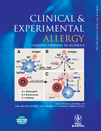
CLINICAL AND EXPERIMENTAL ALLERGY
Exploring Innovative Solutions in Allergy and ImmunologyCLINICAL AND EXPERIMENTAL ALLERGY is a premier peer-reviewed journal dedicated to advancing the scientific understanding of allergy and immunology. Published by Wiley in the United Kingdom, this esteemed journal maintains a significant impact factor, reflecting its high standards and influential research contributions. With an impressive history since its inception in 1971, the journal is poised to continue leading the discourse in the field until at least 2024. It is ranked in the Q2 quartile for both Immunology and Allergy categories, further highlighting its reputable standing within the academic community. The journal's Scopus rankings showcase its academic relevance, securing the 49th and 51st positions in the Medicine and Immunology categories, respectively. Researchers, professionals, and students will find vital insights and contemporary research trends within its pages, making it an essential resource for those invested in understanding and addressing allergic diseases and disorders.
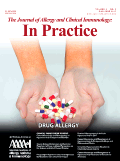
Journal of Allergy and Clinical Immunology-In Practice
Advancing knowledge in allergy and immunology.The Journal of Allergy and Clinical Immunology-In Practice, published by ELSEVIER, stands as a leading platform in the field of allergy and immunology, specifically tailored for practitioners and researchers. With an impressive 2023 Q1 ranking in both the Immunology and Allergy categories, this journal demonstrates a significant impact within the academic community, evidenced by its Scopus rank #41 out of 233 and an impressive percentile rank of 82. The journal focuses on providing advanced studies, clinical findings, and innovative treatment methodologies that address current challenges in allergy and immunology, making it a vital resource for professionals in these fields. With a comprehensive coverage of relevant topics from 2013 to 2024, the journal continues to evolve alongside emerging trends and developments in clinical practice, fostering an environment conducive to scholarly research and application. Although it currently does not offer open access, authors and readers can access a wealth of information and contribute to ongoing dialogues through its robust publication platform.

ASIAN PACIFIC JOURNAL OF ALLERGY AND IMMUNOLOGY
Connecting Asia-Pacific researchers for impactful discoveries.The ASIAN PACIFIC JOURNAL OF ALLERGY AND IMMUNOLOGY, published by the Allergy Immunology Society of Thailand, is a pivotal platform for disseminating high-quality research in the fields of allergy and immunology. Established in 1983, this journal has consistently evolved to address the pressing challenges and advancements in these dynamic disciplines, contributing significantly to the global scientific community's understanding of immunological disorders. With a category ranking of Q3 in Immunology and Allergy, and Q2 in Medicine (miscellaneous) for 2023, the journal stands at the forefront of impactful research, engaging with a diverse audience of researchers, clinicians, and students alike. Although it operates on a non-open access model, its rigorous peer-review process ensures that published articles meet the highest academic standards. Located in Bangkok, Thailand, the journal connects researchers across the Asia-Pacific region, fostering collaboration and innovation to enhance patient care in the realm of allergy and immunology.

Therapeutic Advances in Allergy and Rhinology
Connecting disciplines to enhance allergy and rhinology practices.Therapeutic Advances in Allergy and Rhinology, published by SAGE Publications Inc, is an esteemed journal that focuses on advancing the fields of allergy and rhinology through innovative and impactful research. As an Open Access journal, it provides a platform for researchers, clinicians, and students to share significant findings and therapeutic developments aimed at improving patient outcomes related to allergic conditions and nasal disorders. The journal aims to publish high-quality peer-reviewed articles, reviews, and case studies that contribute to a deeper understanding of the pathophysiology and management of allergies and rhinological conditions. By fostering collaborative dialogue across various disciplines, Therapeutic Advances in Allergy and Rhinology plays a crucial role in enhancing clinical practice and guiding future research in this vital area of health. With an ISSN of 2753-4030, the journal continues to establish itself as a key resource for anyone involved in allergy and rhinology research and practice.
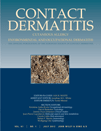
CONTACT DERMATITIS
Pioneering Knowledge in Dermatology and ImmunologyCONTACT DERMATITIS, published by WILEY, is a leading international journal focused on the vital field of dermatology, particularly examining the diagnosis, treatment, and management of contact dermatitis and related skin conditions. With origins dating back to 1975 and a planned convergence period extending to 2024, this esteemed journal serves as a crucial resource for researchers, clinicians, and healthcare professionals dedicated to advancing knowledge in dermatological practices. In the latest rankings, it has achieved a commendable Q2 classification in Dermatology and Q3 classification in Immunology and Allergy for 2023, underscoring its significance within these dynamic fields. Moreover, it holds a notable ranking of #29/142 in Medicine & Dermatology and #130/233 in Medicine & Immunology and Allergy according to Scopus metrics, placing it in the top tier of scholarly publications. While the journal operates on a subscription basis, its comprehensive reviews, original articles, and insightful research findings are invaluable for pushing the boundaries of current dermatological and immunological knowledge. By fostering a deeper understanding of the complexities of skin reactions and their implications, CONTACT DERMATITIS plays a vital role in connecting research with clinical practice, making it an essential read for anyone engaged in the field.